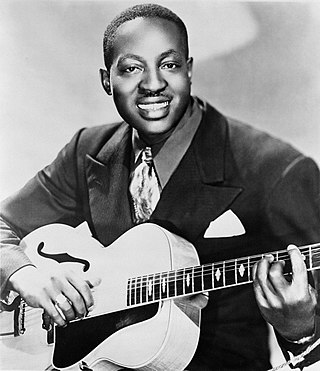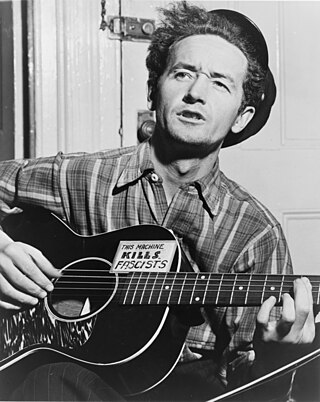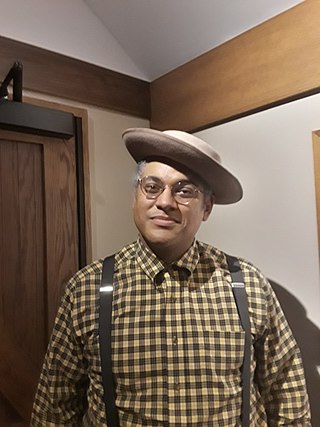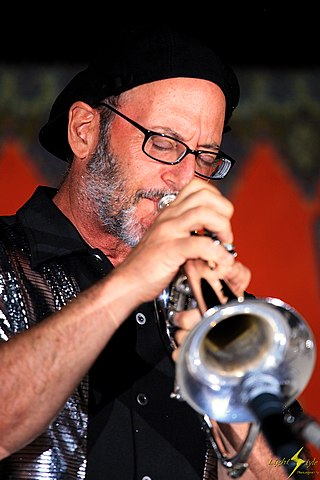
Peter Seeger was an American folk singer-songwriter, musician and social activist. He was a fixture on nationwide radio in the 1940s, and had a string of hit records during the early 1950s as a member of The Weavers, notably their recording of Lead Belly's "Goodnight, Irene," which topped the charts for 14 weeks in 1950. Members of the Weavers were blacklisted during the McCarthy Era. In the 1960s, Seeger re-emerged on the public scene as a prominent singer of protest music in support of international disarmament, civil rights, counterculture, workers' rights, and environmental causes.

Big Bill Broonzy was an American blues singer, songwriter, and guitarist. His career began in the 1920s, when he played country music to mostly African-American audiences. In the 1930s and 1940s, he navigated a change in style to a more urban blues sound popular with working-class black audiences. In the 1950s, a return to his traditional folk-blues roots made him one of the leading figures of the emerging American folk music revival and an international star. His long and varied career marks him as one of the key figures in the development of blues music in the 20th century.

Samuel John "Lightnin'" Hopkins was an American country blues singer, songwriter, guitarist and occasional pianist from Centerville, Texas. In 2010, Rolling Stone magazine ranked him No. 71 on its list of the 100 greatest guitarists of all time.

Henry St. Claire Fredericks Jr., better known by his stage name Taj Mahal, is an American blues musician. He plays the guitar, piano, banjo, harmonica, and many other instruments, often incorporating elements of world music into his work. Mahal has done much to reshape the definition and scope of blues music over the course of his more than 50-year career by fusing it with nontraditional forms, including sounds from the Caribbean, Africa, India, Hawaii, and the South Pacific.

George "Buddy" Guy is an American blues guitarist and singer. He is an exponent of Chicago blues who has influenced generations of guitarists including Eric Clapton, Jimi Hendrix, Jimmy Page, Keith Richards, Stevie Ray Vaughan, Jeff Beck, Gary Clark Jr. and John Mayer. In the 1960s, Guy played with Muddy Waters as a session guitarist at Chess Records and began a musical partnership with blues harp virtuoso Junior Wells.

Kevin Roosevelt Moore, known as Keb' Mo', is an American blues musician. He is a singer, guitarist and songwriter, living in Nashville, Tennessee. He has been described as "a living link to the seminal Delta blues that travelled up the Mississippi River and across the expanse of America." His post-modern blues style is influenced by many eras and genres, including folk, rock, jazz, pop and country. The moniker "Keb Mo" was coined by his original drummer, Quentin Dennard, and picked up by his record label as a "street talk" abbreviation of his given name.

Kenny Neal, is an American blues guitar player, singer, and band member.

Eric Charles Bibb is a Grammy-nominated American-born blues singer and songwriter.
Kevin Kraig Toney was an American jazz pianist and composer who was a member of The Blackbyrds.
"Rock Island Line" is an American folk song. Ostensibly about the Chicago, Rock Island and Pacific Railroad, it appeared as a folk song as early as 1929. The first recorded performance of "Rock Island Line" was by inmates of the Arkansas Cummins State Farm prison in 1934.

The American folk music revival began during the 1940s and peaked in popularity in the mid-1960s. Its roots went earlier, and performers like Josh White, Burl Ives, Woody Guthrie, Lead Belly, Big Bill Broonzy, Richard Dyer-Bennet, Oscar Brand, Jean Ritchie, John Jacob Niles, Susan Reed, Paul Robeson, Bessie Smith, Ma Rainey and Cisco Houston had enjoyed a limited general popularity in the 1930s and 1940s. The revival brought forward styles of American folk music that had in earlier times contributed to the development of country and western, blues, jazz, and rock and roll music.

Sarah Lee Guthrie and Johnny Irion were a musical duo. Guthrie and Irion were married on October 16, 1999, and began performing together as an acoustic duo in late 2000, performing together until they divorced in the mid-2010s. Their music combined Irion's love of rock and blues with Guthrie's roots of folk and country.

Gabriel Witcher is an American multi-instrumentalist, producer, composer, and arranger, best known as a fiddle player and singer. He is a founding member of the string ensemble Punch Brothers. Witcher and his fellow Punch Brothers won the 2019 Grammy for Best Folk Album and were named Affiliate Scholars of Oberlin Conservatory in 2014.

The Union Boys was an American folk music group, formed impromptu in 1944, to record several songs on an album called Songs for Victory: Music for Political Action. Its "all-star leftist" members were Josh White, Sonny Terry, Brownie McGhee, Pete Seeger, Burl Ives, Tom Glazer.

Thomas Jay Hambridge is an American rock, country, and blues, producer, songwriter, musician and vocalist. Hambridge has received two Grammy Awards, an ASCAP award, seven Grammy nominations, seven Boston Music Awards, and has been inducted into the Buffalo Hall of Fame. In December 2015, Hambridge was given the key to his hometown of Buffalo, New York with Mayor Byron Brown declaring December 28 "Tom Hambridge Day." Hambridge's songs have been recorded by several notable artists and have been featured in movie productions, commercials and television programs. He has been referred to as "The White Willie Dixon" by Rock and Roll Hall of Fame Inductee Buddy Guy and Susan Tedeschi's "Secret Weapon".
Luke "Long Gone" Miles was an American Texas blues and electric blues singer and songwriter. He was a protégé of Lightnin' Hopkins and variously recorded or performed with Hopkins, Sonny Terry, Brownie McGhee and Willie Chambers. Miles is best known for his 1964 album Country Born, issued by World Pacific Records.
Fabrizio Poggi is a singer and harmonica player. A Grammy Awards nominee who has received the Hohner Lifetime Award, and has been two times Blues Music Awards nominee, Jimi Awards nominee, and during his long career has recorded twenty two albums. He has performed in the US and Europe with the Blind Boys of Alabama, Garth Hudson of the Band, Steve Cropper, Charlie Musselwhite, Ronnie Earl, John P. Hammond, Marcia Ball, Guy Davis, Eric Bibb, Flaco Jimenez, Little Feat and many others.

Dominique Flemons is an American old-time music, Piedmont blues, and neotraditional country multi-instrumentalist, singer, and songwriter. He is a proficient player of the banjo, fife, guitar, harmonica, percussion, quills, and rhythm bones. He is known as "The American Songster" as his repertoire of music spans nearly a century of American folklore, ballads, and tunes. He has performed with Mike Seeger, Joe Thompson, Martin Simpson, Boo Hanks, Taj Mahal, Old Crow Medicine Show, Guy Davis, and The Reverend Peyton's Big Damn Band.

Jeff Oster is a Grammy-nominated American musician who specializes in trumpet and flugelhorn in the New Age music genre. He is a member of the four-piece band Flow. Oster's style has been described as "Miles Davis meets Pink Floyd." He is a three-time winner of the Independent Music Awards and ten-time winner of the Zone Music Reporter Awards. He was featured on the Laura Sullivan's Grammy-winning album Love's River. Flow's debut album reached number 4 on the Billboard New Age Albums Chart in 2017.

Call Down the Thunder is an album by the American musician Guy Davis, released in 1996. He supported the album with a North American tour.
















